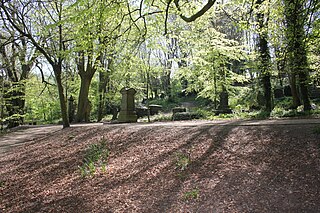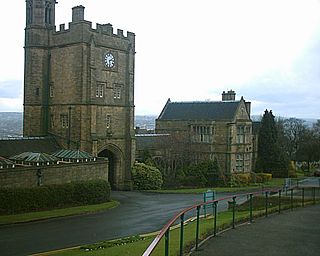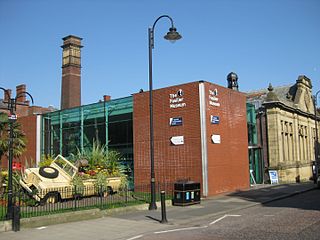Albert Toft was a British sculptor.
Malin Bridge is a suburb of the city of Sheffield, England. It is located at grid reference SK325893 and stands 2+1⁄2 miles north-west of the city centre where the rivers Loxley and Rivelin meet. Malin Bridge is only a small district centred on the road bridge over the River Loxley which carries the B6076 road to Stannington ; it is surrounded by the suburbs of Hillsborough, Wisewood, Walkley and Stannington.


Loxley is a village and a suburb of the city of Sheffield, England. It is a long linear community which stretches by the side of the River Loxley and along the B6077 for almost 2.5 miles (4 km). Loxley extends from its borders with the suburbs of Malin Bridge and Wisewood westward to the hamlet of Stacey Bank near Damflask Reservoir. The centre of the suburb is situated at the junction of Rodney Hill and Loxley Road where the old village green stands and this is located 3 miles (5 km) north west of Sheffield city centre. The suburb falls within the Stannington ward of the City of Sheffield.

The S6 district lies within in the City of Sheffield, South Yorkshire, England. The district contains 180 listed buildings that are recorded in the National Heritage List for England. Of these, one is listed at Grade I, the highest of the three grades, four are at Grade II*, the middle grade, and the others are at Grade II, the lowest grade. The district is in the north west of the city of Sheffield, and covers the areas of Bradfield, Dungworth, Hillsborough, Loxley, Malin Bridge, Middlewood, Stannington, Upperthorpe, Wadsley and Walkley.

The Fusilier Museum is a museum in Bury, Greater Manchester, England. Its collection includes the uniforms, medal and artefacts of the Lancashire Fusiliers.

Revell Grange is a Grade II listed English country house situated on Bingley Lane in the suburb of Stannington overlooking the Rivelin valley within the City of Sheffield, England. The house played an important role as a focal point of early Catholicism within the city and still houses a private chapel to this day.

Christ Church is an Anglican place of worship situated on Church Street in the Stannington area of the City of Sheffield, England. It is a Commissioners' church or “Million Church” as it was built partly with money provided by the Church Building Act of 1824. It is recorded in the National Heritage List for England as a designated Grade II listed building.

Underbank Chapel is a Unitarian place of worship in Stannington, a suburb of Sheffield, South Yorkshire. It is a member of the General Assembly of Unitarian and Free Christian Churches, the umbrella organisation for British Unitarians.

Stannington is a suburb in the City of Sheffield, England. The area is located in the civil parish of Bradfield, and is in the electoral ward of Stannington. Stannington is situated on the western edge of the Sheffield urban area

The Chindit Memorial is a war memorial in London, England, that commemorates the Chindit special forces, which served in Burma under Major General Orde Wingate in the Second World War. The memorial was erected in Victoria Embankment Gardens in 1990, near the Ministry of Defence headquarters, and also commemorates Wingate, who died on active service in Burma in 1944. It became a Grade II listed building in August 2020.

The Sheffield War Memorial also known as Sheffield Cenotaph, is a Grade II* listed war memorial located at Barker's Pool, Sheffield, standing to the south of Sheffield City Hall, which is also Grade II* listed.

The Dulwich College War Memorial is located at the eastern front of Dulwich College on College Road in Dulwich in the London Borough of Southwark. It commemorates the alumni of the college who died in both the First and Second World Wars. The memorial was designed by W. H. Atkin-Berry, an alumnus of the college. It was unveiled on 17 June 1921, the Dulwich College Founder's Day, by Major General Sir Webb Gillman, and dedicated by the Dean of Durham, James Welldon. Gillman was an alumnus of the college, and Welldon had served as Master of Dulwich College from 1883 to 1885. It has been Grade II listed on the National Heritage List for England since May 2010. The heritage listing places the memorial within a "visual and contextual relationship" with the Grade II* listed Main College building.

Kingston upon Thames War Memorial, in the Memorial Garden on Union Street, Kingston upon Thames, London, commemorates the men of the town who died in the First World War. After 1945, the memorial was updated to recognise casualties from the Second World War. The memorial was commissioned by the town council and was designed by the British sculptor Richard Reginald Goulden. The memorial includes a bronze statue of a nude warrior, carrying a flaming cross and wielding a sword with which he defends two children from a serpent, erected on a granite plinth, with bronze plaques listing the names of the dead. Goulden designed a number of such allegorical memorials, including others at Crompton, Greater Manchester, and Redhill, Surrey. The Kingston memorial was designated a Grade II listed structure in 1983. This was revised upwards in 2016 to Grade II*, denoting a building or structure of particular importance.

Bakewell War Memorial is a 20th-century grade II listed war memorial in Bakewell, Derbyshire.














